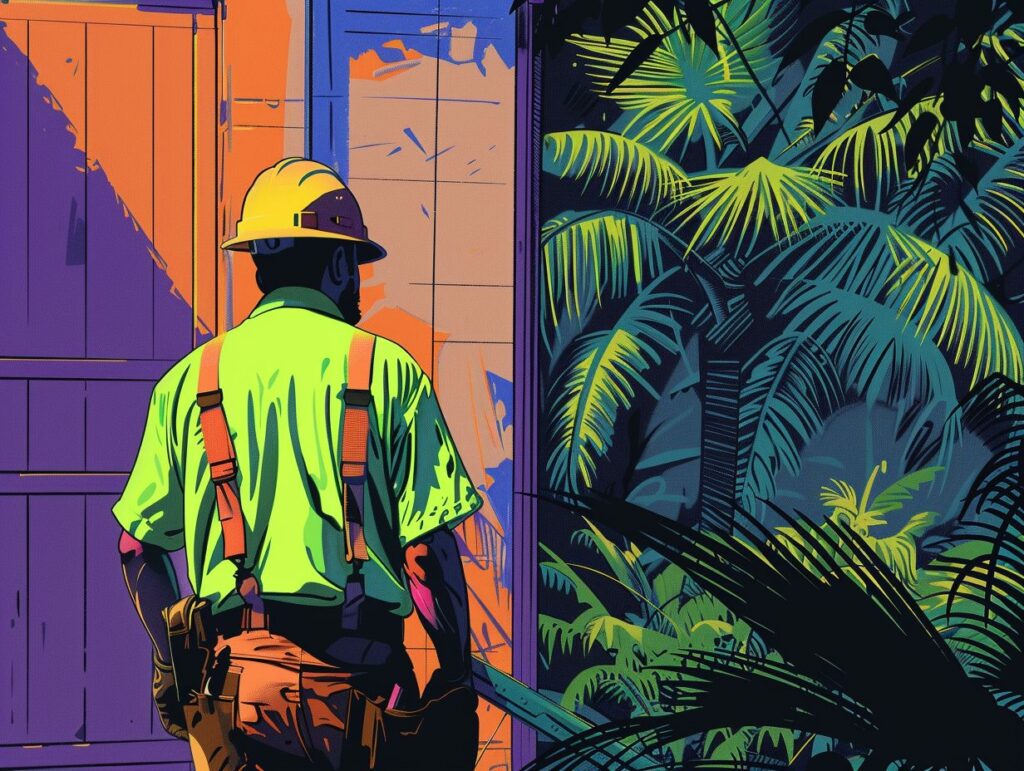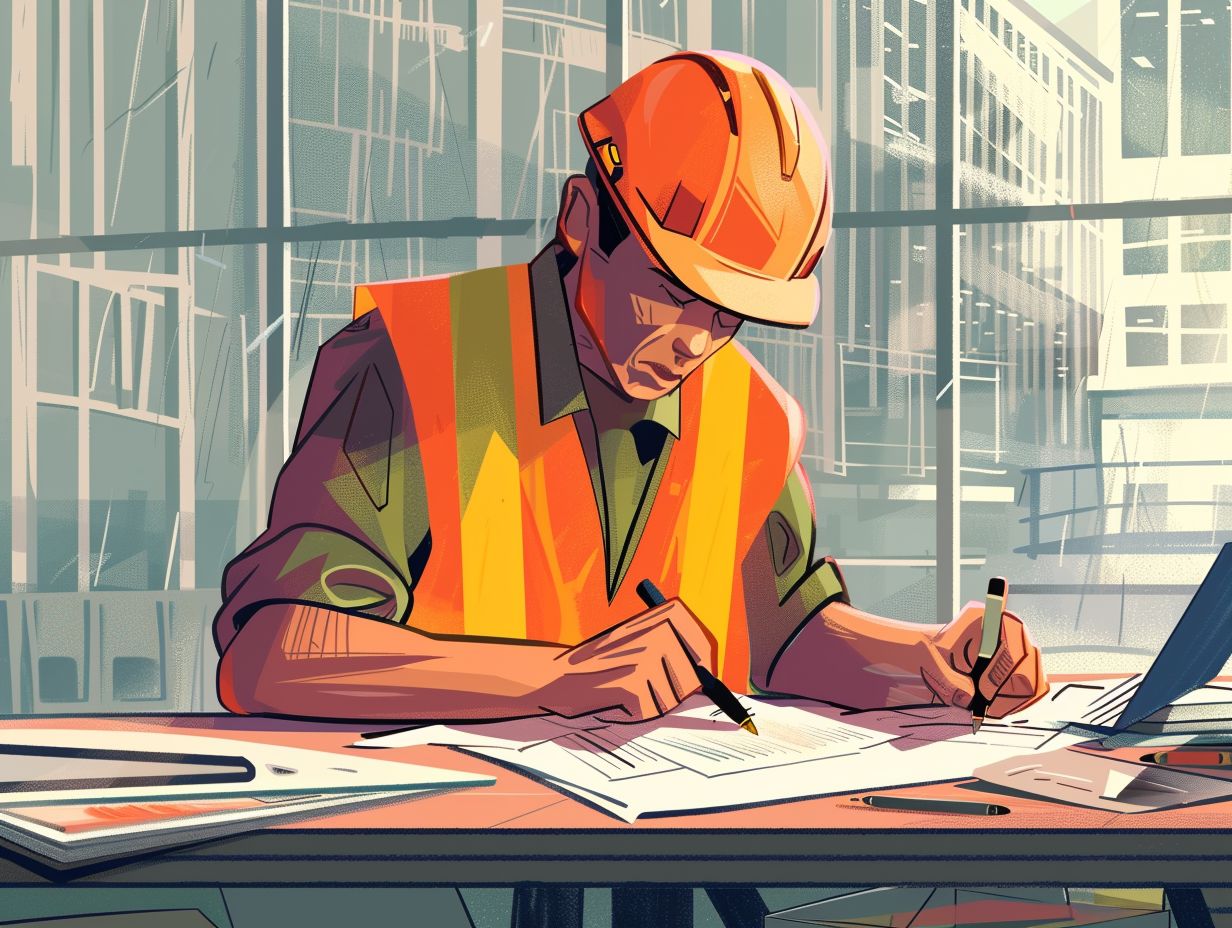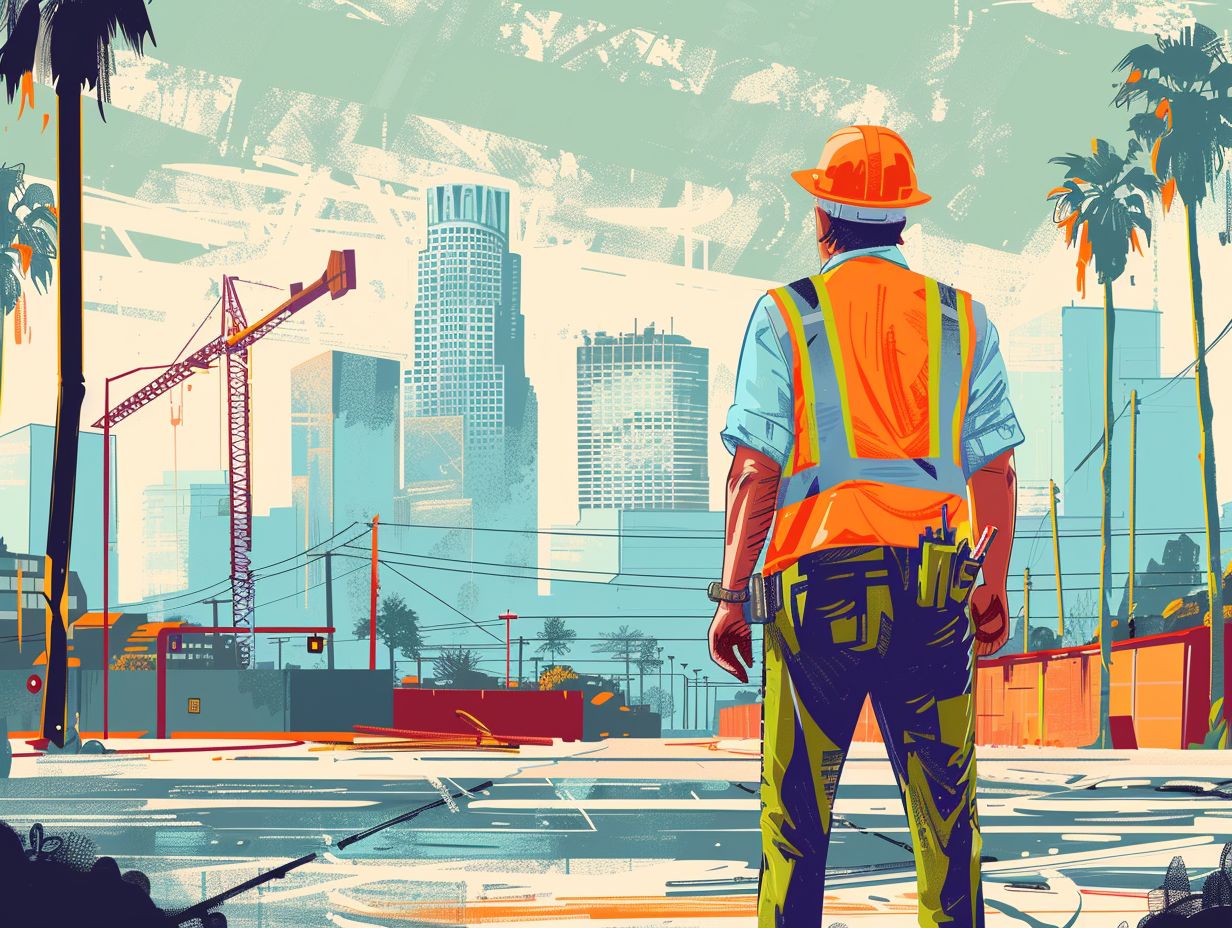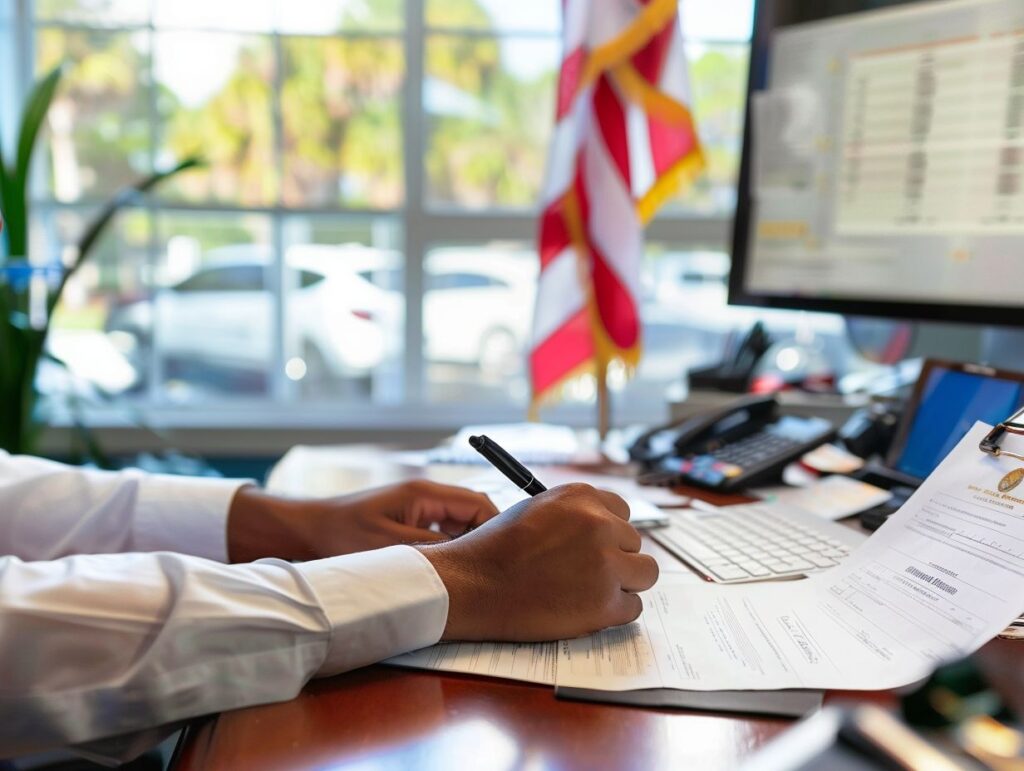Construction accidents are a common occurrence in the construction industry, often resulting in serious injuries or fatalities. In Florida, specific laws and regulations are in place to protect workers and ensure they receive deserved compensation in case of an accident.
In this article, we will discuss the most common types of construction accidents, employer requirements, and the rights of injured workers in Florida. We will also outline the necessary steps to take after a construction accident, including seeking medical attention, reporting the accident, documenting the scene, and contacting a lawyer.
Learn how to file a construction accident claim in Florida, whether through a workers’ compensation claim or a personal injury lawsuit. Explore possible outcomes of a construction accident claim, such as compensation for medical expenses, lost wages, pain and suffering, and punitive damages.
If you or a loved one has been injured in a construction accident in Florida, it is crucial to understand your rights and take the necessary steps to protect them.
What Are the Laws and Regulations for Construction Accidents in Florida?
Construction sites in Florida are regulated by a combination of state laws and federal OSHA guidelines. These regulations are in place to promote safety and minimize accidents.
What Are the Requirements for Employers in Florida?
Employers in Florida must follow safety protocols, provide appropriate training, and comply with the regulations established by the Florida Division of Workers’ Compensation to maintain a safe construction site.
This entails conducting regular safety training sessions for employees to educate them about potential hazards at construction sites. Additionally, routine inspections should be conducted to promptly identify any safety issues and address them accordingly.
Any accidents or injuries that happen on the worksite must be documented and reported according to the specific accident reporting procedures outlined by the Florida Division of Workers’ Compensation. This organization plays a critical role in monitoring and ensuring compliance with these regulations.
What Are the Rights of Injured Workers in Florida?
In Florida, injured workers have the right to apply for workers’ compensation and receive medical treatment for their injuries as per Florida law.
The process of initiating a workers’ compensation claim involves promptly reporting the injury to the employer. Once the claim is submitted, various benefits may be accessible to the injured worker, such as medical care, wage replacement, and vocational rehabilitation if necessary. Florida law also includes legal safeguards to prevent unjust treatment or discrimination against injured workers due to their work-related injuries.
Workers are entitled to seek legal advice and pursue legal remedies if they feel that their rights under workers’ compensation laws are being infringed upon.
What Steps Should Be Taken After a Construction Accident?
Following a construction accident, it is important to promptly take measures to guarantee the safety and well-being of the injured worker, as well as to safeguard their legal rights for any possible claims.
1. Seek Medical Attention
Following a construction accident, the initial and crucial step is to promptly seek medical attention to address any injuries sustained.
Receiving timely medical care not only supports quicker recovery and minimizes the possibility of complications but also aids in documenting the severity of the injuries. This documentation is vital for potential legal actions or compensation.
Maintaining thorough records of medical treatments received and associated expenses is essential. These records can serve as significant evidence if there is a need to pursue compensation regarding the construction accident.
2. Report the Accident
After receiving medical attention, it is important to report the accident to the employer or site supervisor promptly.
This action is essential to ensure that all required documentation is in order for both legal and insurance reasons. When reporting the accident, it is crucial to include information such as the date, time, and location of the incident, along with any witnesses who were present. Additionally, any injuries sustained should be detailed clearly.
Prompt reporting not only assists in meeting legal requirements but also enables the insurance company to process any potential claims efficiently.
3. Document the Accident Scene
Recording the accident scene is a crucial step in preserving evidence for any future claims or legal actions.
When documenting the scene, it is important to take photographs from various angles to capture the overall layout and condition of the area. These photos can be used as visual evidence to support the details provided in any report or claim.
Along with photographs, recording witness statements can provide valuable firsthand accounts of what happened. Detailed notes should also be kept, noting specific details such as weather conditions, road markings, and any other relevant factors. This documentation can be crucial in establishing the sequence of events and supporting any legal cases that may arise.
4. Contact a Lawyer
It is advisable to seek out a lawyer with expertise in construction accidents to ensure proper legal representation and safeguard your rights. An experienced attorney, such as those at the Ryan Hughes Law Firm in Orlando, can provide valuable guidance throughout the legal process.
They possess the necessary knowledge and skills to navigate the complex network of laws and regulations that govern construction accidents. By retaining their services, one can enhance the likelihood of receiving fair compensation for any injuries sustained on a construction site.
A seasoned attorney is capable of handling negotiations with insurance companies and advocating on your behalf in court, guaranteeing the preservation of your rights and the protection of your best interests.
How to File a Construction Accident Claim in Florida?
Initiating a construction accident claim in Florida entails comprehending the legal options accessible, which include workers’ compensation claims and personal injury lawsuits.
1. File a Workers’ Compensation Claim
For file a workers’ compensation claim, the injured worker is required to notify their employer and submit a claim to the Florida Division of Workers’ Compensation.
Once the initial notification has been made, the injured worker will need to complete specific claim forms provided by the employer or the workers’ compensation insurance carrier. These forms typically request detailed information about the injury, including the circumstances surrounding it, the timing of the incident, and any medical treatment received.
Accuracy is vital during this stage, as any inaccuracies could potentially delay or jeopardize the processing of the claim. Meeting all deadlines established by the employer or the state is essential to ensure the claim is processed promptly.
By furnishing comprehensive and accurate documentation, the injured worker can enhance their chances of securing benefits such as coverage for medical treatment, wage replacement, and vocational rehabilitation assistance.
2. File a Personal Injury Lawsuit
If the construction accident was caused by negligence, the injured worker may file a personal injury lawsuit to seek additional damages.
To begin the process of filing a personal injury lawsuit, the injured party will typically start by gathering evidence to support their claim of negligence. This involves collecting medical records, incident reports, witness statements, and any other documentation that can demonstrate the liable party’s failure to adhere to safety regulations.
Once evidence is gathered, the next step is calculating the damages incurred, which can include medical expenses, lost wages, and ongoing rehabilitation costs.
Legal representation is crucial in navigating the complexities of personal injury law, as skilled attorneys can advocate for fair compensation, including monetary recompense for pain and suffering, as well as potentially punitive damages to hold the negligent party accountable for their actions.
What Are the Possible Outcomes of a Construction Accident Claim?
The potential results of a construction accident claim can vary, often including compensation for medical costs, lost income, pain and suffering, and occasionally punitive damages.
1. Compensation for Medical Expenses
One of the main outcomes of a construction accident claim is receiving compensation for medical expenses associated with the injuries sustained.
These medical expenses encompass various costs, such as initial treatments like emergency room visits, surgeries, diagnostic tests, and hospital stays.
Ongoing care, like follow-up appointments, physical therapy sessions, prescription medications, and necessary medical equipment, may also be considered. Additionally, rehabilitation services, such as occupational therapy or counseling, that are essential to aid in the individual’s recovery process may also fall under the covered expenses.
To ensure accurate reimbursement, it is crucial to maintain detailed records of all medical expenses, including bills, receipts, and reports, which are then included as part of the claim documentation.
2. Compensation for Lost Wages
Injured workers may be eligible to receive compensation for lost wages if their injuries prevent them from returning to work.
Calculating lost wages involves determining the average weekly wage for the worker before the injury occurred. This calculation typically encompasses wages from employment, bonuses, and overtime pay.
To claim lost wages, workers usually need to provide documentation such as pay stubs, tax returns, and medical records indicating the extent of their injury. Workers’ compensation programs serve a crucial role in offering wage replacement benefits to injured workers, ensuring financial support during their recovery.
It’s important to be aware that there are often limitations or caps on the amount of compensation that can be received for lost wages, which depend on the individual case and state regulations.
3. Compensation for Pain and Suffering
Compensation for pain and suffering is often sought through a personal injury lawsuit to address the physical and emotional impact of the injuries.
Evaluation of pain and suffering in these cases typically involves examining the severity of the injuries, the duration of recovery, and the long-term impact on the individual’s quality of life. Factors such as medical treatment expenses, loss of income due to the inability to work, and emotional distress are taken into consideration by the court when determining the types of damages to be awarded.
Legal representation plays a crucial role in advocating for fair compensation, as experienced lawyers can navigate complex legal processes, negotiate with insurance companies, and present a strong case in court for maximum recovery. Without proper legal guidance, individuals may risk receiving inadequate compensation for their pain and suffering.
4. Punitive Damages
In situations where the construction accident results from severe negligence or deliberate misconduct, punitive damages may be granted to penalize the accountable party. These damages are intended as a punitive measure beyond compensatory actions, with the goal of discouraging similar misconduct in the future.
To qualify for punitive damages, the behavior of the responsible party must be considered egregious or intentional. Courts typically demand clear evidence of malicious intent or blatant disregard for safety. Pursuing punitive damages necessitates a strong focus on upholding legal rights and seeking equitable compensation for victims.
The imposition of punitive damages can have a substantial impact on the accountable party, not just financially but also in terms of reputation and responsibility.
Frequently Asked Questions
What should I do if I am involved in a construction accident in Florida?
If you are involved in a construction accident in Florida, the first step is to seek medical attention for any injuries. You should also report the accident to your employer and document any evidence, such as photos and witness statements.
Who is responsible for my construction accident injury in Florida?
In Florida, the responsibility for a construction accident injury typically falls on the party deemed liable for the accident. This could be the property owner, contractor, or a third-party such as a manufacturer.
Can I file a construction accident claim in Florida if I am a subcontractor?
Yes, subcontractors are also entitled to file construction accident claims in Florida. However, the claims process may differ depending on the specific circumstances of the accident. It is best to consult with a lawyer for guidance on your specific case.
How long do I have to file a construction accident claim in Florida?
In Florida, the statute of limitations for filing a construction accident claim is four years from the date of the accident. It is important to act quickly and consult with a lawyer to ensure your claim is filed within this timeframe.
Do I need a lawyer to handle my construction accident claim in Florida?
While it is not required by law to hire a lawyer for a construction accident claim in Florida, it is highly recommended. A lawyer can help protect your rights and ensure you receive the compensation you deserve for your injuries.
What types of compensation can I receive for my construction accident claim in Florida?
The types of compensation you may receive for a construction accident claim in Florida include medical expenses, lost wages, pain and suffering, and potentially punitive damages. The amount of compensation will depend on the specifics of your case and the severity of your injuries.


























Rate this article:
No Comments yet!